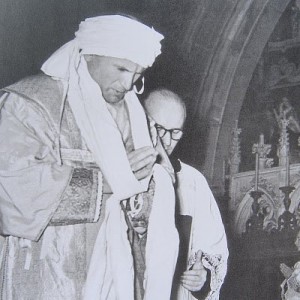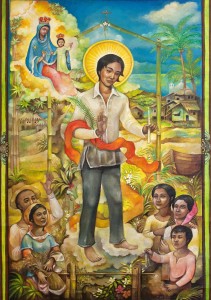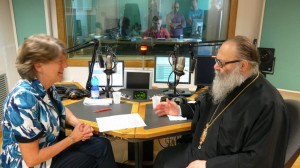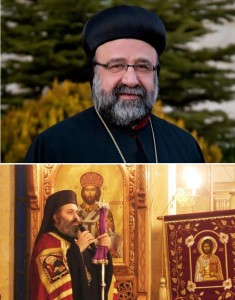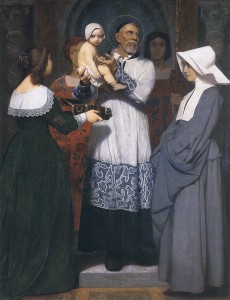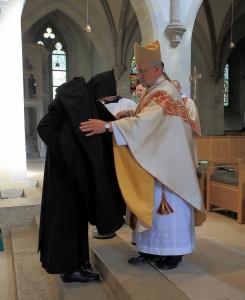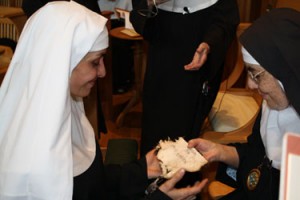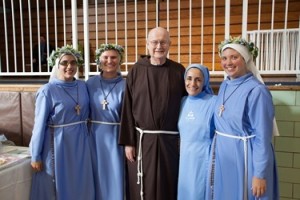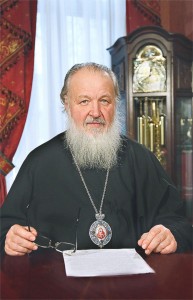On a yearly basis the Pope meets with the full assembly of the various departments at the Holy See that assist him in his ministry. This past Saturday (21 September 2013) Pope Francis spoke to the participants of the Plenary Assembly of the Pontifical Council for Social Communications. This Council’s head is Archbishop Claudio Maria Celli, 72, and the Secretary is Monsignor Paul Tighe, 55, a priest of the archdiocese of Dublin. There are several cardinals, bishops, priests, religious and laity who serve as a advisors to the Council.
I’ve been noticing nowadays how often Francis uses the words “discernment,” “journey,” “dialogue,” “understanding,” “encounter” –words that contribute to the building of relationships in Jesus Christ. For me, the notion of relationships is key: it is more than mere social networking, or having a familiarity with technology, or a keeping a Facebook community entertained. Being in relationship means being with another in the Christian sense is caring for the destiny of the other, of sharing life, being human, of telling the other the reasons for our hope, having the capacity to be concretely present to another person who may be difficult. Being relational is not the same as engineering a meeting; it is the fundamental posture of openness to someone greater, an openness to everyone.
The controlling ideas of the Pope are thus: meeting Christ today, really, and faithfully, so that we make a journey of faith by building the Kingdom and confessing Jesus as Savior, without fracture, sans fantasy. The concern of Pope Francis ought to be our concern, too: do we communicate that the Church is a home to all people, or a museum of plastic saints???
The address, like the Pope’s recent interview, needs to be read in continuity with the tradition of the Church and in dialogue with each other. Hence, the the following is not meant only for the advisors and other interested parties, but for all the baptized: cleric, religious and lay person. No exception.
Here’s the Pope address with emphasis added.
Dear Brothers and Sisters, good morning!
I greet you and I thank you for your work and commitment to the important sector of social communications – but having spoken to Archbishop Celli, I must change “sector” to the important “dimension of life” which is that of social communications. I wish to thank Archbishop Claudio Maria Celli for the greeting that he extended to me on your behalf. I would like to share some thoughts with you.
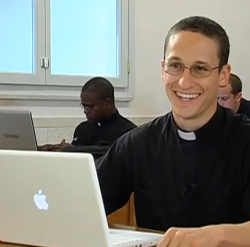 First of all: the importance of social communications for the Church. This year is the fiftieth anniversary of the Conciliar Decree Inter Mirifica. This anniversary is more than a commemoration; the Decree expresses the Church’s attentiveness towards communication and all its instruments, which are also important in the work of evangelisation. But towards its instruments – communication is not an instrument! It’s something else. In the last few decades, the various means of communication have evolved significantly, but the Church’s concern remains the same, taking on new forms and expressions. The world of social communications, more and more, has become a “living environment” for many, a web where people communicate with each other, expanding the boundaries of their knowledge and relationships (cf. Benedict XVI, Message for the 2013 World Communications Day). I wish to underline these positive aspects, although we are all aware of the limitations and harmful factors which also exist.
First of all: the importance of social communications for the Church. This year is the fiftieth anniversary of the Conciliar Decree Inter Mirifica. This anniversary is more than a commemoration; the Decree expresses the Church’s attentiveness towards communication and all its instruments, which are also important in the work of evangelisation. But towards its instruments – communication is not an instrument! It’s something else. In the last few decades, the various means of communication have evolved significantly, but the Church’s concern remains the same, taking on new forms and expressions. The world of social communications, more and more, has become a “living environment” for many, a web where people communicate with each other, expanding the boundaries of their knowledge and relationships (cf. Benedict XVI, Message for the 2013 World Communications Day). I wish to underline these positive aspects, although we are all aware of the limitations and harmful factors which also exist.
In this context – and this is the second reflection – we must ask ourselves: what role should the Church have in terms of its own practical means of communication? In every situation, beyond technological considerations, I believe that the goal is to understand how to enter into dialogue with the men and women of today, in order to appreciate their desires, their doubts, and their hopes. They are men and women who sometimes feel let down by a Christianity that to them appears sterile, struggling precisely to communicate the depth of meaning that faith gives. We do in fact witness today, in the age of globalisation, a growing sense of disorientation and isolation; we see, increasingly, a loss of meaning to life, an inability to connect with a “home”, and a struggle to build meaningful relationships. It is therefore important to know how to dialogue, and how to enter, with discernment, into the environments created by new technologies, into social networks, in such a way as to reveal a presence that listens, converses, and encourages. Do not be afraid to be this presence, expressing your Christian identity as you become citizens of this environment. A Church that follows this path learns how to walk with everybody! And there’s also an ancient rule of the pilgrims, that Saint Ignatius includes, and that’s why I know it! In one of his rules, he says that anyone accompanying a pilgrim must walk at the same pace as the pilgrim, not ahead and not lagging behind. And this is what I mean: a Church that accompanies the journey, that knows how to walk as people walk today. This rule of the pilgrim will help us to inspire things.
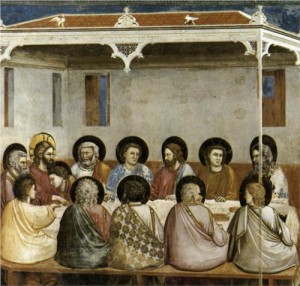 The third: it’s a challenge that we all face together in this environment of social communications, and the problem is not principally technological. We must ask ourselves: are we capable of bringing Christ into this area, or rather, of bringing about the encounter with Christ? To walk with the pilgrim through life, but as Jesus walked with the pilgrims of Emmaus, warming their hearts and leading them to the Lord? Are we capable of communicating the face of a Church which can be a “home” to everyone? We talk about the Church behind closed doors. But this is more than a Church with open doors, it’s more! Finding “home” together, building “home”, building the Church. It’s this: building the Church as we walk. A challenge! To lead to the rediscovery, through means of social communication as well as by personal contact, of the beauty which is at the heart of our existence and our journey, the beauty of faith, the beauty of the encounter with Christ. Even in the context of social communications, the Church is required to bring warmth, to warm hearts. Does our presence and plans measure up to this requirement, or do we remain mired in technicalities? We hold a precious treasure that is to be passed on, a treasure that brings light and hope. They are greatly needed. All this, however, requires a careful and thorough formation in this area for priests, for religious men and women, for laity. The great digital continent does not only involve technology, but is made up of real men and women who bring with them what they carry inside, their hopes, their suffering, their concerns, their pursuit of truth, beauty, and good. We need to show and bring Christ to others, sharing these joys and hopes, like Mary, who brought Christ to the hearts of men and women; we need to pass through the clouds of indifference without losing our way; we need to descend into the darkest night without being overcome and disorientated; we need to listen to the illusions of many, without being seduced; we need to share their disappointments, without becoming despondent; to sympathise with those whose lives are falling apart, without losing our own strength and identity (cf. Pope Francis, Address to the Bishops of Brazil, 27 July 2013, n. 4). This is the walk. This is the challenge.
The third: it’s a challenge that we all face together in this environment of social communications, and the problem is not principally technological. We must ask ourselves: are we capable of bringing Christ into this area, or rather, of bringing about the encounter with Christ? To walk with the pilgrim through life, but as Jesus walked with the pilgrims of Emmaus, warming their hearts and leading them to the Lord? Are we capable of communicating the face of a Church which can be a “home” to everyone? We talk about the Church behind closed doors. But this is more than a Church with open doors, it’s more! Finding “home” together, building “home”, building the Church. It’s this: building the Church as we walk. A challenge! To lead to the rediscovery, through means of social communication as well as by personal contact, of the beauty which is at the heart of our existence and our journey, the beauty of faith, the beauty of the encounter with Christ. Even in the context of social communications, the Church is required to bring warmth, to warm hearts. Does our presence and plans measure up to this requirement, or do we remain mired in technicalities? We hold a precious treasure that is to be passed on, a treasure that brings light and hope. They are greatly needed. All this, however, requires a careful and thorough formation in this area for priests, for religious men and women, for laity. The great digital continent does not only involve technology, but is made up of real men and women who bring with them what they carry inside, their hopes, their suffering, their concerns, their pursuit of truth, beauty, and good. We need to show and bring Christ to others, sharing these joys and hopes, like Mary, who brought Christ to the hearts of men and women; we need to pass through the clouds of indifference without losing our way; we need to descend into the darkest night without being overcome and disorientated; we need to listen to the illusions of many, without being seduced; we need to share their disappointments, without becoming despondent; to sympathise with those whose lives are falling apart, without losing our own strength and identity (cf. Pope Francis, Address to the Bishops of Brazil, 27 July 2013, n. 4). This is the walk. This is the challenge.
Dear friends, the concern and the presence of the Church in the world of social communications is important in order to dialogue with the men and women of today and bring them to meet Christ, but the encounter with Christ is personal. It cannot be manipulated. In these times we see a great temptation within the Church, which is spiritual harassment: the manipulation of conscience; a theological brainwashing which in the end leads to an encounter with Christ which is purely nominal, not with the Live Person of Christ. In a person’s encounter with Christ, both Christ and the person need to be involved! Not what’s wanted by the “spiritual engineer”, who wants to manipulate people. This is the challenge. To bring about the encounter with Christ in the full knowledge, though, that we ourselves are means of communication, and that the fundamental problem is not the acquisition of the latest technologies, although these are necessary to a valid, contemporary presence. It is necessary to be absolutely clear that the God in whom we believe, who loves all men and women intensely, wants to reveal himself through the means at our disposal, however poor they are, because it is he who is at work, he who transforms, and he who saves us.
Let us all pray that the Lord may warm our hearts and sustain us in the engaging mission of bringing him to the world. I ask you for your prayers, because this is my mission too, and I assure you of my blessing.
